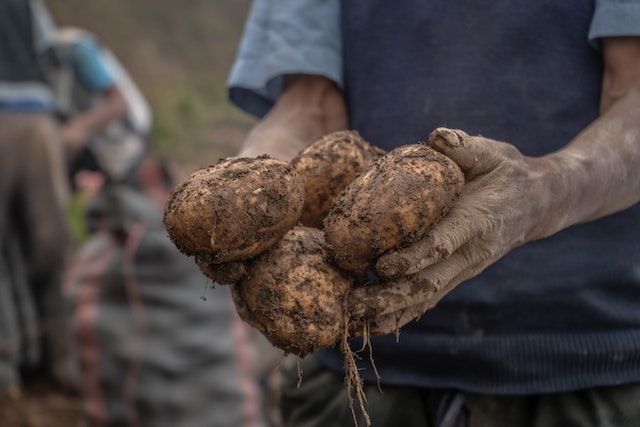How Rising U.S. Potato Prices Are Impacting the Industry
In recent years, potato prices in the United States have been on the rise. This trend has had a significant impact on the potato industry, with produce businesses feeling the greatest pinch.

In recent years, potato prices in the United States have been on the rise. This trend has had a significant impact on the potato industry, with produce businesses feeling the greatest pinch. Continued price increases pose a daunting challenge as businesses attempt to anticipate how much of their inventory will be affected by market fluctuations and cost-of-goods changes.
In this article, we'll discuss various aspects of the rising price of potatoes in the U.S., and how Silo can be a powerful tool in reacting to unforeseen market circumstances.
Factors contributing to the rise in potato prices
Here are a few factors that have contributed to the rise in spud prices.
1. Weather
Potatoes are a weather-sensitive crop, and extreme weather events like droughts, floods, and heat waves can reduce the yield of potatoes. For example, in 2018, a drought in Idaho (a major potato-producing state) led to a decline in potato production and an increase in prices.
As the climate crisis worsens and causes the prevalence of natural disasters to increase, this issue is expected to continue, effectively driving up prices.
2. Cost of production
Grower-shippers must invest in seeds, fertilizers, logistics, and labor, as well as fuel to power machinery. All of these production costs have risen in recent years, and have been passed down to consumers in the form of higher overall potato prices.
3. Rising demand
There’s been an increasing demand for potatoes, both within the United States and globally. The popularity of potatoes growing in developing countries has led to increased exports of potatoes from the United States.
This increased demand has put pressure on supply, contributing to higher prices.
The impacts of price hikes on the industry
So what have been the effects of potato industry price hikes? How have they affected different parties down the supply chain?
The impact on grower-shippers
In some cases, higher prices can lead to higher profits for grower-shippers, as they’re able to sell their potatoes at markups. However, this kind of market instability can also bring about increased risk. Demand is at risk of fluctuating if prices are increased, leading to fewer sales, wasted inventory, and ultimately, loss of revenue.
Higher potato prices can lead to a shift in consumer behavior, with people opting for cheaper alternatives, which ends up having a negative effect on grower-shippers.
The impact on consumers
Higher prices for potatoes mean that consumers must pay more for what’s considered a staple food. This can burden low-income individuals and families who may already be struggling to make ends meet.
As the cost of a potato continues to rise, affordability becomes increasingly difficult for individuals and families on a tight budget, leading to a search for other, less expensive foods over potatoes.
The impact on restaurants and other food service businesses
Prices increasing at the wholesale level has caused difficulties for restaurants and other food service establishments that rely on potatoes as a key ingredient in their dishes.
The higher price of potatoes has seen businesses facing higher operating costs, which have been passed on to consumers in the form of higher menu prices. Over time, this may lead to a decline in demand for potato-based dishes and a decrease in profits for the food service industry.
Possible solutions to rising potato prices
Here are some possible solutions that could come into play to counteract rising prices.
1. Boosting efficiency and productivity
One way that the potato industry is trying to address the issue of rising prices is by increasing efficiency and productivity. Produce businesses are using more advanced technology and techniques to improve their overall operations. For example, some businesses are using software to optimize the use of their resources.
By increasing efficiency, businesses can produce more with fewer resources, which can help reduce the cost of production and, in turn, lower the price of potatoes.
2. Diversifying inventory
Another strategy that the industry is using to address rising prices is diversifying the types of potatoes they deal with. Different types of potatoes have different uses and demands, and by expanding their reach through greater variety, businesses can be more resilient to changes in demand and pricing.
By diversifying inventory, produce businesses can reduce risk and increase profits.
3. Regulatory measures
The government is also taking steps to address the issue of rising potato prices.
The United States Department of Agriculture (USDA) provides support through programs such as the Market Access Program (MAP) and the Foreign Market Development (FMD) program. These programs help increase the competitiveness of U.S. potatoes in the global market and promote exports, which can help increase demand for potatoes and potentially lower prices.
React to market fluctuations more effectively with Silo
The increasing potato wholesale price has been a paramount concern for produce businesses, as it has the potential to affect both the profits of those in the industry and the prices that consumers pay. It remains to be seen how the industry will adjust to any changes, but it’s an issue that will continue to be closely watched.
You can make your produce business less sensitive to price fluctuations by streamlining your operational processes with Silo. Silo is a modern software solution built specially for the produce industry to make managing your day-to-day operations easier.
Book a demo with Silo today!
Want to book a demo with us?
Add your info and we’ll get one scheduled with you.